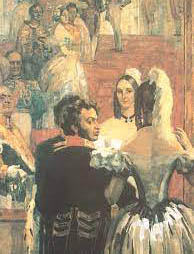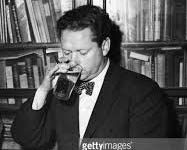The Love of Alexander Puskin
(The Love Story of Alexander Puskin)
The Love of Alexander Puskin
Alexander Puskin was a great Russian poet. His place in Russian Literature is as high as Shakespeare’s in English Literature, Walt Whitman’s in American Literature, and Rabindranath’s in Bengali Literature. It is because in his writings there is a reflection of the depth of human feeling as in Shakespeare, the fondness for human freedom and liberty as in Walt Whitman and the lyricism as that of Rabindranath. Besides being a great poet, he was a storyteller and a novelist too.
This great poet, Alexander Puskin was born in an aristocratic family feeding on the spoon of gold in 1799 in Moscow. His mother tongue was French, but he learned the standard Russian Language from the mouth of peasants, labourers and servants. As he came of an aristocratic family, he easily could get the availability of opportunity to read and write from a tender age. From his childhood, he was charming to look at and as he grew young he became more and more strong, brave and attractive. And as he grew up, his private life became wayward and licentious like that of a street drunkard. His love life was even more fickle and more dissolute. His love was more physical than spiritual. His love for a woman was: first a physical urgent; second, it was a source of pleasure and thirdly it was a death. He fell in love not with one or two or three women, but with more than three dozen of women. His love for every woman began in hope of joy but ended in despair. His first love was with one of his neighbouring cousins. She was of his age. But this love affair was brief. Soon the girl was married off to another young gentleman. His second love was with a girl of the steward of their home. But this love was only physical. These two love affairs were as fickle as the storm wind in summer.
After having his schooling finished, he took a job in the Foreign Department of Russia. The job was in name only. He had no work to do. Hence, to spend time he took shelter in studying and writing poetry. But only poetry made him bored and as his recreation and entertainment, he took shelter in women and wine. His licentious and wayward life began to be wild. At that time he became a member of a revolutionary party against the monarchy and began to criticize the royal power. Soon his criticism reached the ears of the Tsar and then he was transferred to the far-off south frontier of Russia. But there also, his conduct seemed not to change. Then the Russian Government divorced him from his service and sent him to his home.
At home, he got much freedom and comfort. He did nothing, but write poetry and became a philanderer. He pursued after all the charming girls of the peasants, slaves and labourers of his surrounding villages and played the game of love with them. The girls were also entrapped easily as Puskin was then an attractive youth and a good poet. One after the other he violated the chastity of the village girls. His love became only a physical need and a source of entertainment. While one’s first love fails then one’s heart breaks down and then hearty affection for a particular girl gets dried up. So happened to Alexander Puskin, while his first love with his cousin (daughter of an uncle) broke down in the bud then his sense of love became fickle and carnal only.
When Alexander Puskin became thirty years old, by then he fell in love, especially in physical love, with thirty-seven girls one by one. One winter noon in 1828 he came to the acquaintance of a charming youthful girl in a Ball-dance sport. Her name was Miss Natalia. She was as beautiful as a piece of newly bloomed red lotus. Her two checks were as fleshy as an apple and as red as cherry. As soon as he saw her, he became mad to have her company. Then he proposed to her to enter into a marriage bond with him. But she declined the offer. Puskin was obstinate to have her anyway. At last, he married Natalia. His love for Natalia seemed to be deep. In the meantime, Puskin got a job in the foreign department under the good auspicious of the Tsar. The poet Puskin began to live a still life, but the storm soon began all of a sudden. One day Puskin came to know that Natalia had been in deep love with another youth named Dantes. Dantes was born to a French couple and became a founding son of an Olandaz ambassador in Russia. Natalia, after her marriage with Puskin, had been keeping communication with Dantes. When the secrecy came to light Alexander Puskin broke down mentally. A gap between Puskin and Natalia began to grow and it grew broad. Puskin and Dantes became envious of each other. Puskin was strong and dauntless obstinate youth. So he went to Dantes to give him a lesson. On the other hand, Natalia was in favour of Dantes. At first they- Puskin and Dantes- entered into a dwelling. But Dantes made a trick and shot Puskin with his pistol. Consequently, the life of a great poet of Russia came to an end at the age of thirty-eight in 1837.
Alexander Puskin wrote many love poems which echoed his fickle and amorous love for women. His love poems show that physical love is the main thing—without physical love no love is possible. In his ‘Yev Genio Anegin’, a prose poem, he reveals his frustration in love. The hero of the poem ‘Anegin’ represents the poet himself. It is the allegorical record of his love for Natalia.
Alexander Puskin though was a great poet, yet he could not achieve greatness in moral life. As a poet, he is a paradigm of greatness and as a lover, he is an emblem of immortality and it is his immorality and fickleness in love matters that caused his death before time. Had he not indulged in immoral carnal love, he would have not met the untimely death and the world would have been gifted with more elite writings from him! 0 0 0
Alexander Puskin
N.B. The article ‘The Love of Alexander Puskin’ originally belongs to the book ‘Love of Reputed Persons‘ by Menonim Menonimus.
Alexander Puskin
Books of Composition by M. Menonimus:
- Advertisement Writing
- Amplification Writing
- Note Making
- Paragraph Writing
- Notice Writing
- Passage Comprehension
- The Art of Poster Writing
- The Art of Letter Writing
- Report Writing
- Story Writing
- Substance Writing
- School Essays Part-I
- School Essays Part-II
- School English Grammar Part-I
- School English Grammar Part-II..
Books of S. Story by M. Menonimus:
Related Search:
- 25 Best Love Quotes
- Greatest Real-Life Love Stories
- Psychology of Love
- Beautifully Written Love Stories
- The Secret Lives of Writers











